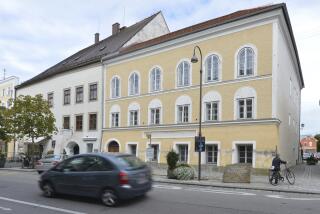Waldheim Issue, Austria’s Past
- Share via
Yes, the past that Austria has hidden from itself is not a pretty one. Your staff writer, Tyler Marshall, did not go far enough in his article (April 21), “Waldheim Issue Forces Austria to Face Its Past.” Hitler’s route from Braunau to Vienna was strewn with roses! On April 10, 1938, the vote for Anschluss with Germany was overwhelmingly approved by the Austrians.
Austria’s role is well documented by Simon Wiesenthal in his text, “The Murderers Among Us.” Among the evidence:
--Every 10th Austrian was a member of the Nazi Party--a ratio higher than in Germany.
--Between 1945 and 1947, when they had to register with the military governments of the Four Powers, 611,720 admitted to Nazi membership.
--One-third of those working for the SS (elite guard) extermination machinery were Austrians. Almost half of the 6 million Jewish victims were killed by Austrians. (Austria accounted for only 8% of the population of the Third Reich).
--The Kristallnacht (Night of Broken Glass), in Vienna on Nov. 9, 1938, was much worse than in Berlin.
--Of the 5,000 names on the list of war criminals in Yugoslavia, 2,499 were Austrians.
Marshall mentions the roles of Adolf Eichmann, Ernst Kaltenbrunner and Arthur Seyss-Inquart in the extermination of millions. A few more if you please. Odilo Globotschnigg (in charge of Treblinka, Sobibor, Maidanek and Belzec). Twenty-five of his staff were also Austrians. And Alois Brunner (now No. 1 on the wanted list), reportedly living in Syria today.
And please don’t give all the credit to the secret police. The civilian police played a very active role in Austria (and also in all of Europe), in providing traveling execution squads. Wiesenthal writes that when the war was over they were back on the police force.
Austria’s contribution to the concentration camp system was Mauthausen and its 60 sub-camps. It was liberated by the 11th Armored Division of the 3rd U.S. Army on May 5, 1945. On the 40th anniversary of its liberation, it was the only camp that did not receive any media attention. This was due to the Bitburg affair. This year, on the 41st anniversary, we have another historical obscenity. Those making the yearly pilgrimage will witness the Austrian presidential elections on May 4, which finds a former Nazi and a man accused of being a Nazi on the ballot!
Simon Wiesenthal has been asked why he remained in Austria after he was liberated from Mauthausen. He said the prosecution of Nazi war criminals was done more energetically in West Germany than in Austria. He knew!
VAL RODRIGUEZ
Signal Hill
More to Read
Sign up for Essential California
The most important California stories and recommendations in your inbox every morning.
You may occasionally receive promotional content from the Los Angeles Times.













